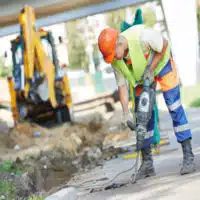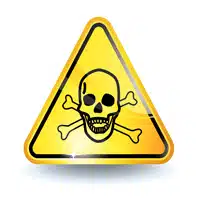Hand-Arm Vibration Syndrome (HAVS), also known as Jackhammer Syndrome, is a neuromuscular disorder affecting the hands of construction, mining, forestry, and manufacturing workers that use heavy power tools on a regular basis. According to the College of Science, Technology, Engineering and Mathematics at Texas A & M University-Texarkana, HAVS affects nearly half of the two million American workers exposed to heavy power tools, such as jackhammers, grinders, riveters, drills, and chain saws.
Symptoms and Prognosis
The first symptoms to appear are tingling and numbness in the fingers and hands. Many workers affected by HAVS believe the symptoms are temporary and continue to work with high-powered tools without seeking medical intervention. As time goes on, the disorder progresses and causes pain, blanching of the fingers, and loss of strength in the hands as damage to the nerves and blood vessels increases. Once a worker’s fingers begin turning white, the disorder is irreversible.
In some cases, gangrene can develop and require amputation of the fingers or hands. Damage to the nerves and blood vessels leads to restricted blood flow and sensitivity. Workers with advanced HAVS can lose feeling in their fingers and hands, which can lead to severe infection and gangrene. When the infection reaches the bone, amputation is the only way to stop the progression of the gangrene.
Medical intervention and physical therapy can reduce the damage caused by HAVS, but only in the very early stages of the disorder. Reducing exposure to high-powered tools is necessary to protect workers showing signs of HAVS. Failure to address the damage caused by continuous exposure to intense vibrations will result in permanent damage and disability.
Protecting Workers from HAVS
Employers are legally responsible to provide a safe working environment that is free from unnecessary hazards. For those in the construction and manufacturing industries, using power tools with lower handle vibration mechanisms and reducing the amount of exposure workers have to high-vibration equipment is essential for preventing HAVS. The American Society of Safety Engineers’ Professional Safety Journal and the Occupational Safety and Health Administration (OSHA) recommend the following safety practices to reduce the damage caused by high vibration equipment:
- Ensure hands are kept warm to increase blood flow
- Keep a light grip on equipment
- Protect hands from cold exhaust air from pneumatic tools
- Rest the hands for 10 minutes per hour
- Use protective gloves to reduce the impact of vibrations on the fingers and hands
- Seek medical help as soon as symptoms appear
- Use damping techniques and vibration isolators
- Alternate tools during the workday
- Limit the number of continuous hours working with high-powered tools
- Provide proper training that includes recognizing the symptoms of HAVS and safe work practices
Construction and manufacturing employers can significantly reduce the number of HAVS victims by investing in low-vibration equipment. New technology on jackhammers, riveters, chain saws, and drills reduce the intensity of vibrations on the hands and fingers.
Wilmington Work Injury Lawyers at Rhoades & Morrow Help Injured Workers Claim Workers’ Compensation Benefits
If you have been diagnosed with HAVS or sustained a work-related injury, call a Wilmington work injury lawyer at Rhoades & Morrow today. Call us at (302) 427-9500 or contact us online to schedule a free consultation today. Located in Wilmington, Bear, and Milford, Delaware, we serve clients throughout the state, including the areas of Elsmere and Seaford.





